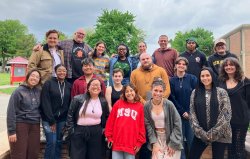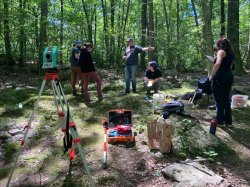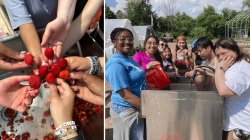On Their Land, In Their Voices
Students Learn About Indigenous History and Erasure from Local Native Tribes During Summer Field School
Posted in: Anthropology, Homepage News and Events, Native American and Indigenous Studies, Religion, Student News

This summer, the Native American and Indigenous Studies program hosted a Summer Field School where students had the opportunity to visit various locations around New Jersey to meet with tribal leaders and learn from them about the reclaiming of their cultures. The Field School is directed by Dr. Maisa Taha (Anthropology), Dr. Lisa Brooks (Educational Foundations), Dr. Chris Matthews (Anthropology), and Dr. Mark Clatterbuck (Religion).
The four week program had a full roster of thirteen students along with one postdoctoral fellow and three TAs who were returning past participants, now helping run the trip.
According to Dr. Clatterbuck, professor and co-director of the program, students have a lot of unlearning to do before they can learn Indigenous history. Students discussed the failures of the school systems in not teaching them about Native history or the fact that tribes still exist and live all over New Jersey. In order to begin deconstructing these misconceptions, The Native American and Indigenous Studies program prioritizes getting students in direct contact with Indigenous elders and tribes.
The best way for Native history to be taught is “on their land, in their voices,” says Dr. Clatterbuck.
Week one was spent with the Turtle Clan of the Ramapough Lunaape Tribe in Ringwood. Under the guidance of Ramapough elder Wayne Mann, students learned about Ford Motor Company’s dumping of toxic waste onto the land in the 1960s and 1970s. Having never been given a proper clean up, the land has since been declared a federal superfund site.
The Turtle Clan taught students about their efforts to demand resources and support for a clean up project and students were able to help them create a digital repository documenting Ford’s contamination of Ringwood.
Week two was spent in Bridgeton with the Nanticoke Lenni-Lenape Tribe on the Nanticoke tribal lands and camping out at Cohanzick Sanctuary. Students were able to see how the Cohanzick Sanctuary spreads Indigenous wisdom on how people can reconnect with nature.
Member of the Stockbridge Band of Mohegans from Wisconsin, Wanonah Spencer, and Ramapough youth organization, The Tomorrow People, led talking circles and provided guidance on insightful discussions on how to quiet one’s “human.” The Tomorrow People, formed by Wayne Mann, focuses on developing solutions for problems and trauma derived from the contamination of Ringwood.
The tribe emphasized that environmental justice is necessary now more than ever as we face a new peak in the climate crisis. They reminded students that their ancestors handled the planet with great care and if they want to pass along a healthy world to the next generation, land must be restored and taken care of.
As students were shown how to develop their personal relationships with the environment, the tribe encouraged them to do the same with one another, showing how both relationships go hand-in-hand.
For senior Nawal Rai, a Geography, Environmental, and Urban Studies major, camping at Cohanzick Sanctuary was unpredictably illuminating.
“It was honestly very healing for me,” he says. “We went on a walk at midnight through the woods and stargazed…The elders helped us connect with the site and showed us how to open up with one another, and it brought me closer to so many people.”
This level of engagement is exactly how Rai prefers to learn: “We’re not just learning about the history of Indigenous people from an instructor in a classroom. It’s beyond that. Everything we learned came from people who have experienced the violence of our state, and the stories about their own bloodline finally came from them instead of a textbook.”
The third week was spent with Chief Dwaine Perry, Principal Chief of the Ramapough Mountain Indians, Vincent Morgan, Executive Director of Ramapough Mountain Indians, and Owl, attorney for the Ramapough, bringing the students to a historic Ramapough burial ground. What was once a place built to honor their deceased loved ones has since become another dumping ground for the public.
Students learned about the tribe’s preservation efforts whilst working with Ramapough elders and caretakers of the grounds to clean up the property and study county and state maps. They used the information they gathered and GIS mapping to mark graves and outline the borders of the area to more thoroughly document its existence.

The fourth and final week of the program brought students to work at Munsee Three Sisters Medicinal Farm in Newton. The 14-acre organic farm is run by Turtle Clan Chief Vincent Mann, Michaeline Picaro Mann, and the farm’s manager, Lenny Welch (Stockbridge-Munsee Band of Mohican Indians), as a direct response to the contamination of the Ringwood Community.
The farm uses traditional Indigenous practices while harvesting crops and students were shown these customs while weeding, mulching, harvesting, and learning about Indigenous cultivation and the importance of food sovereignty.

Beyond providing safe food for tribes that cannot harvest on their own lands, the Munsee Three Sisters Medicinal Farm has also been a home for the revitalization of the Munsee language. Students learned about how language can be recovered and also decorated signs to be placed all over the property with crops labeled in Munsee with their English translations.
“I think one of the biggest parts of the unlearning process for me was that there still are communities around working to revitalize their language and culture, and I needed to understand that movement, why it is important to them, and why it is important for the world to preserve language and culture,” Nawal Rai says.

The Field School’s program ended with a heart-warming celebration when the students were invited to participate in the annual Nanticoke Powwow at the Salem County Fairgrounds. Each year, the Nanticoke Powwow hosts two days of cultural celebration filled with traditional music, dance, food, and craftsmanship, and students had the unique opportunity to help those running the festivities.
While the history of New Jersey’s treatment of Indigenous tribes tells a painful story of the intended erasure of Native people, the Field School’s summer program highlights their resilience and survival.
Many of us often succumb to the fallacy that Indigenous tribes live far away, either in distance or in time, but the Native American and Indigenous Studies program dismantles the mentality that refers to Native people in the past tense, and the interpersonal relationships and experiences that students gained during the 2024 summer season is only one way they do it.
Check out the flipbook created by students about the 2024 Field School Experience!
You may also be interested in:
Native American Studies Finds Strength in Partnership with NJ Tribal Communities
Community-based Learning Makes an Impact
Students Plant Seeds to Revive a Native American Language
Written by Sarah Ramirez
